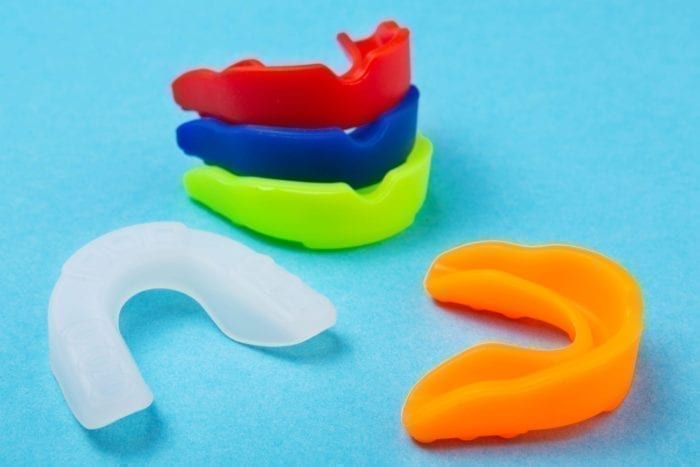Custom sports mouthguards are used to protect teeth during contact sports. However, sports mouthguards cannot treat bruxism, or teeth clenching and grinding. Dental mouthguards, or nightguards, are worn at night to stop tooth damage caused by bruxism. Although they seem similar, sports mouthguards and nightguards cannot be used interchangeably.
Chapel Hill, NC dentist Dr. Riley Hewgley provides mouthguards for sports and for teeth grinding, but there are marked differences between the two. Learn more below.

What Are Sports Mouthguards?
Custom sports mouthguards are made from thick durable plastic to protect teeth from damage when playing contact sports. Sports mouthguards prevent tooth damage and loss as well as soft tissue damage from collisions, falls, and accidents. When compared to over-the-counter mouthguards, custom professional sports mouthguards do not slip, reduce jaw clenching, and allows the wearer to drink and speak with the mouthguard. Dr. Hewgley takes dental impressions of teeth to make sure that the mouthguard fits properly and will not fall out during games. Because sports mouthguards are made from a thick plastic material, they cannot be worn at night when asleep.
What Are Dental Mouthguards?
Dental mouthguards or nightguards are used to stop patients from damaging their teeth from nightly teeth clenching and grinding. Dr. Hewgley will take dental impressions of your teeth so that he can craft a custom mouthguard for you. When worn at night, this mouthguard prevents the teeth from contact. Nightguards are made from a thinner plastic than sports mouthguards and are meant to reposition the jaw and allow the jaw muscles to relax. This type of mouthguard also alleviates the pain caused by repeated jaw clenching and teeth grinding.
Contact Tarheel Dentistry Today
Do you have bruxism? Do you or your child play contact sports? Request an appointment with Chapel Hill dentist Dr. Hewgley today to protect your teeth from damage caused by contact sports or teeth grinding. You may call (919) 551-8847 or schedule a consultation on our website. Feel free to ask Dr. Hewgley any remaining questions you may have about treatment with mouthguards. He will be happy to help you get the answers you need.
